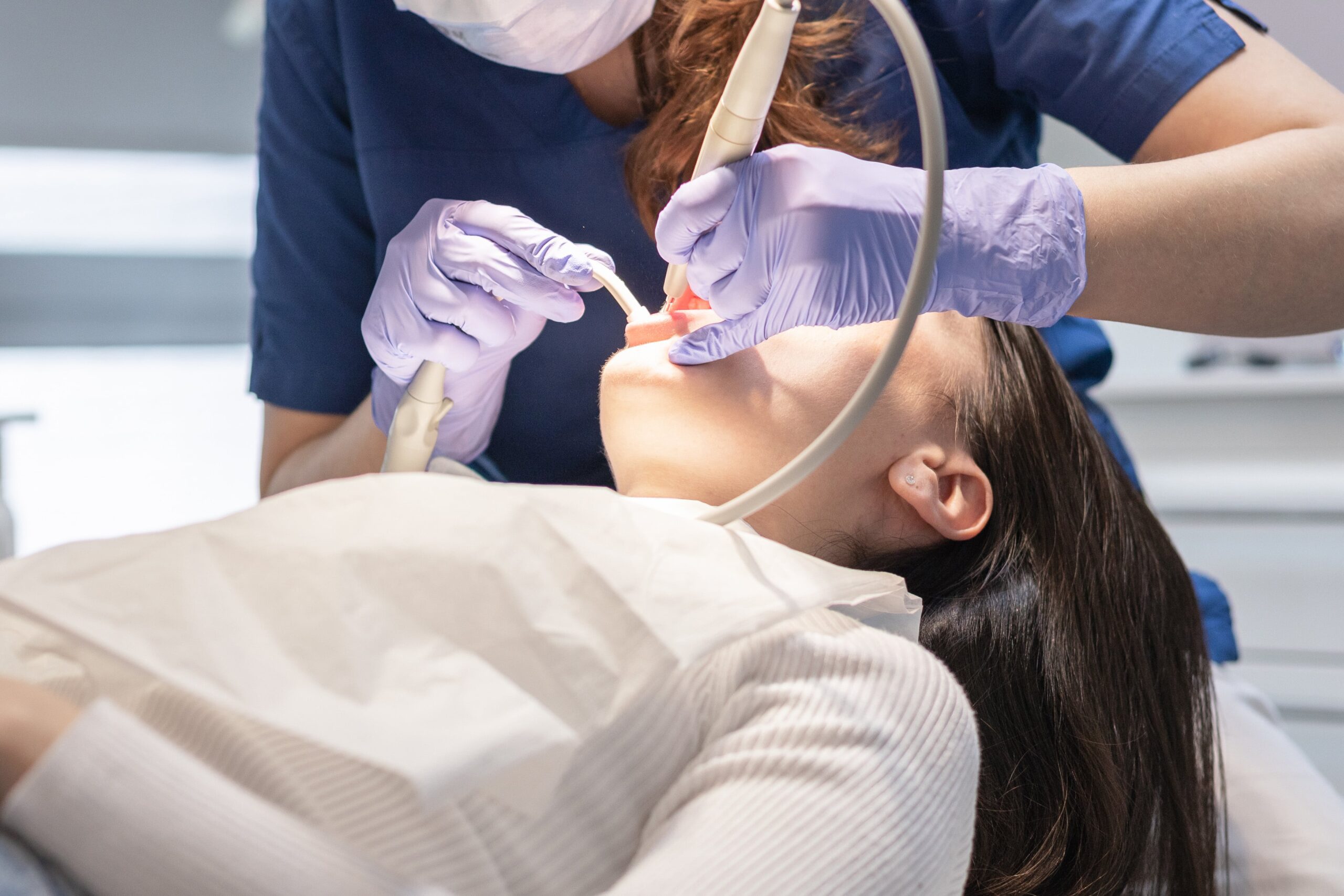Highlights
- Deep cleaning isn’t painful, most patients only feel mild pressure or sensitivity thanks to numbing options.
- It’s different from a regular cleaning because it removes tartar and bacteria below the gumline.
- Mild tenderness after treatment is normal and usually goes away in a few days.
- Good aftercare matters, soft brushing, saltwater rinses, and following dentist instructions help healing.
- The long-term benefits are big, healthier gums, stronger teeth, fresher breath, and protection against gum disease.
Dental deep cleaning, also known as scaling and root planing, goes beyond a regular dental cleaning to treat gum disease and maintain oral health. It focuses on removing plaque, tartar, and bacteria from below the gumline, where traditional cleanings can’t reach. This procedure helps prevent gum disease from worsening, reduces inflammation, and promotes healthier gums and teeth.
One of the most common concerns people have is, “Does it hurt?” The good news is that with modern dental techniques and tools, deep cleanings are much more comfortable than you might expect. Dentists often use numbing agents or other comfort measures to ensure the process is as gentle as possible. Instead of dreading it, you can feel confident that a dental deep cleaning is an effective way to protect your smile and overall health.
What is a Deep Cleaning?

A deep cleaning is a specialized dental procedure designed to clean below the gumline. Also known as scaling and root planing, it involves removing plaque and tartar buildup from tooth surfaces and the roots of teeth to promote healthier gums. While a regular cleaning focuses on the visible parts of your teeth, a deep cleaning goes further to address issues under the gumline.
The Difference Between a Regular Cleaning and a Deep Cleaning
- Regular Cleaning:
- Targets the teeth above the gumline.
- Removes plaque, tartar, and stains from the surface.
- Primarily focused on maintaining oral hygiene for healthy teeth and gums.
- Deep Cleaning:
- Focuses on areas below the gumline where bacteria and tartar accumulate.
- Includes scaling, which cleans plaque and tartar from beneath the gums, and root planing, which smooths out root surfaces to prevent future bacteria growth.
- Recommended when signs of gum disease are present.
Why Do Dentists Recommend Deep Cleaning?
Dentists often suggest a deep cleaning to treat or prevent gum disease (also called periodontal disease). This procedure is especially important if you have symptoms such as:
- tartar buildup,
- red or inflamed gums, and
- bleeding while brushing or flossing
Related Reading: Best Floss for Bleeding Gums
When left untreated, gum disease can lead to more serious problems like gum recession, tooth loss, and even bone damage. By treating the issue early with a deep cleaning, you can protect your oral health and stop gum disease in its tracks. It also helps reduce inflammation and allows your gums to heal properly.
Does a Deep Cleaning Hurt?
Most patients feel little to no pain during a deep cleaning, but some may experience mild discomfort. This procedure is carefully designed to clean below the gumline, where tartar and bacteria build up, so it’s normal to wonder about what to expect.
How Do Dentists Reduce Pain?
To keep patients comfortable, modern dentistry uses local anesthesia and numbing gels to minimize any sensation during the procedure. The dentist will gently numb the treatment area, ensuring the process is as smooth and pain-free as possible. For those who still feel nervous, additional comfort options can often be discussed.
Patient Comfort Is Always a Priority
Dentists prioritize your experience just as much as the effectiveness of the treatment. Advances in dental technology, paired with a compassionate approach, make deep cleanings more accessible and less intimidating than ever before.
What to Expect During the Procedure

Here’s a simple breakdown of the process:
- Preparation and Numbing
Before anything begins, the dentist will numb the area using a local anesthetic. This ensures that you’re comfortable throughout the procedure. You may feel a small pinch as the anesthetic is applied, but it works quickly to block any pain. - Cleaning or Treatment
Depending on the procedure, the dentist will either remove plaque and tartar, treat a cavity, or address other dental issues. You might notice gentle pressure, minor scraping sounds, or even a sensation of water as tools are used to clean or shape your teeth. - Finishing Touches
Once the treatment is complete, the dentist will check everything to ensure it’s perfect and talk you through any aftercare steps.
How Long Does It Take?
The time needed for your appointment depends on the procedure. A standard cleaning typically takes about 30 to 60 minutes, while more involved treatments may take a bit longer. Your dentist will provide you with an estimate upfront.
Common Sensations During a Visit
During the procedure, some patients may experience:
- Pressure from the dental tools
- A mild scraping sensation as tartar or plaque is removed
- Possible sensitivity if areas of the gums are inflamed
It’s important to remember that these sensations are completely normal!
Why Some People Feel Discomfort
Sometimes, patients may feel a little more sensitive during their dental visit. Here’s why:
Inflamed Gums: Swollen gums can naturally be more tender during cleanings.
Severe Tartar Buildup: More buildup may require extra work to remove, which can take longer.
Higher Gum Sensitivity: Some people simply have more sensitive gums. It’s nothing to worry about.
Knowing that any discomfort is temporary, and that the long-term benefits of healthy teeth and gums far outweigh this short-term inconvenience, can make the process much more reassuring.
Tips to Make Your Deep Cleaning More Comfortable

Here are some helpful tips to consider:
Talk to Your Dentist About Numbing Options
Feeling nervous about discomfort? Ask your dentist about numbing options available to you. This can include topical numbing gel or local anesthesia to ensure a pain-free experience.
Practice Relaxation Techniques
To stay calm during the procedure, try deep breathing exercises or bring along your favorite headphones to listen to soothing music or a podcast.
Share Your Concerns
If you experience dental anxiety, don’t keep it to yourself. Talk openly with your dentist, so they can adjust their care and provide reassurance throughout the appointment.
Follow Post-Treatment Instructions
After your cleaning, your dentist will provide you with specific guidelines for aftercare. Follow these instructions carefully to promote healing and reduce any lingering discomfort.
What to Expect After a Deep Cleaning
It’s normal to experience mild tenderness, gum soreness, or sensitivity to hot and cold after a deep cleaning. These symptoms are typically short-lived and should resolve within a few days.
How to Care at Home
To help with healing and minimize discomfort, follow these simple tips:
- Use a soft-bristled toothbrush to be gentle on your gums.
- Rinse your mouth with warm saltwater to soothe irritation.
- Take an over-the-counter pain reliever, like ibuprofen, if needed to ease discomfort.
When to Call Your Dentist
While mild discomfort is expected, contact your dentist if you experience symptoms like severe pain, swelling that doesn’t improve, or excessive bleeding. We’re here to help you feel your best and keep your smile healthy.
The Long-Term Benefits of Deep Cleaning

When it comes to oral health, deep cleaning does more than just freshen your breath, it lays the foundation for a healthier future. Here’s how:
Prevents Gum Disease from Worsening
One key benefit of deep cleaning is its ability to stop gum disease in its tracks. By removing plaque and tartar below the gumline, it helps reduce inflammation and prevent the condition from escalating into more serious stages.
Related Reading: How Gum Disease is Treated
Protects Bone and Tooth Stability
Unchecked gum disease can lead to loss of bone and, eventually, tooth instability. Deep cleanings protect the foundation of your oral health, preserving your natural teeth and ensuring long-term stability.
Improves Overall Oral Health and Freshens Breath
This treatment doesn’t just give your smile a boost; it also has a ripple effect on your entire oral health. By eliminating bacteria and debris that brushing and flossing can’t reach, it leaves your mouth feeling truly fresh and clean.
Comfort Today Helps Avoid Major Issues Tomorrow
While gum disease can lead to significant discomfort and costly treatments down the road, deep cleaning offers a preventative solution. The care you invest in today can save you from pain and complications later, helping you maintain a confident, healthy smile.
Related Reading: Deep Cleaning Teeth Cost
FAQs
How long does a deep cleaning take?
It usually takes about 1–2 visits depending on how much buildup there is and the health of your gums. Each appointment can last 45 minutes to an hour.
What should I expect after a deep cleaning?
You might notice sore gums, slight bleeding, or sensitivity to hot and cold for a few days. This is normal and improves with proper aftercare.
How do I take care of my mouth after a deep cleaning?
Use a soft toothbrush, rinse with warm salt water, and follow any instructions your dentist gives you. Over-the-counter pain relief can also help if needed.
Can I eat right after a deep cleaning?
It’s best to wait until the numbness wears off to avoid biting your tongue or cheeks. Stick to soft foods for the first day if your gums feel tender.
How often do I need a deep cleaning?
Most patients only need it once, followed by regular checkups and cleanings. If you have gum disease, your dentist may recommend maintenance cleanings every few months.
Why is a deep cleaning important for gum health?
It removes bacteria and tartar below the gumline, which helps stop gum disease, protect bone, and keep your teeth strong and healthy.
Deep Cleaning Doesn’t Have To Be A Painful Experience
While it’s normal to feel slight sensitivity during or after the procedure, with proper techniques and care, discomfort is minimal and temporary. The health benefits, including preventing gum disease and maintaining your overall oral health, far outweigh any short-lived sensitivity. Your gums, and your future self, will thank you for the investment in their care.
If you’ve been told you need a deep cleaning or you’re concerned about your gum health, we’re here to make the process comfortable and stress-free. Contact me on Instagram or fill-out our online form to schedule a visit or ask your questions. We’d love to help you get started on your path to a healthier smile!





















